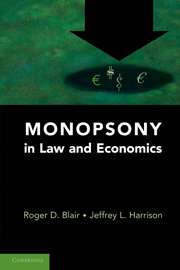Book contents
- Frontmatter
- Contents
- Preface
- ONE Introduction
- TWO The Antitrust Laws and Monopsonistic Forms of Conduct
- THREE Economic Theory of Monopsony
- FOUR The Antitrust Response to Monopsony and Collusive Monopsony
- FIVE Cooperative Buying Efforts
- SIX Bilateral Monopoly
- SEVEN Monopsony and Antitrust Enforcement
- EIGHT Monopsony in Action: Agricultural Markets
- NINE Monopsony in Action: The NCAA
- TEN Monopsony in Action: Physician Collective Bargaining: Monopoly or Bilateral Monopoly
- ELEVEN Final Comments
- Bibliography
- Index
- References
FIVE - Cooperative Buying Efforts
Published online by Cambridge University Press: 05 June 2012
- Frontmatter
- Contents
- Preface
- ONE Introduction
- TWO The Antitrust Laws and Monopsonistic Forms of Conduct
- THREE Economic Theory of Monopsony
- FOUR The Antitrust Response to Monopsony and Collusive Monopsony
- FIVE Cooperative Buying Efforts
- SIX Bilateral Monopoly
- SEVEN Monopsony and Antitrust Enforcement
- EIGHT Monopsony in Action: Agricultural Markets
- NINE Monopsony in Action: The NCAA
- TEN Monopsony in Action: Physician Collective Bargaining: Monopoly or Bilateral Monopoly
- ELEVEN Final Comments
- Bibliography
- Index
- References
Summary
Introduction
As Chapter 3 illustrates, collusive monopsony can present many of the same economic concerns as pure monopsony. Accordingly, the antitrust response to price fixing by buyers generally has been similar to the response to price fixing by sellers. In actuality, determining the appropriate antitrust response to joint decision making by competing buyers can be a complicated matter. The problem is that when buyers cooperate, one cannot predict the economic results on an a priori basis.
Two common examples of buyer cooperation illustrate this point. First, buyers may agree to use the same inputs or to use them in a specified combination resulting in product standardization. For example, all the child care providers in a community may form an associate and agree that, as a condition of membership, no less than a certain portion of the caregivers will have college training. By adhering to the rule and publicizing their standard, it would be possible to lower the transaction costs of prospective customers. This, of course, will tend to increase the demand for the services of association members. On the other hand, such an agreement would also amount to an agreement to limit demand for other inputs, thereby driving their prices down. It could also increase cost to a common level and, therefore, lead to price uniformity.
- Type
- Chapter
- Information
- Monopsony in Law and Economics , pp. 106 - 122Publisher: Cambridge University PressPrint publication year: 2010



